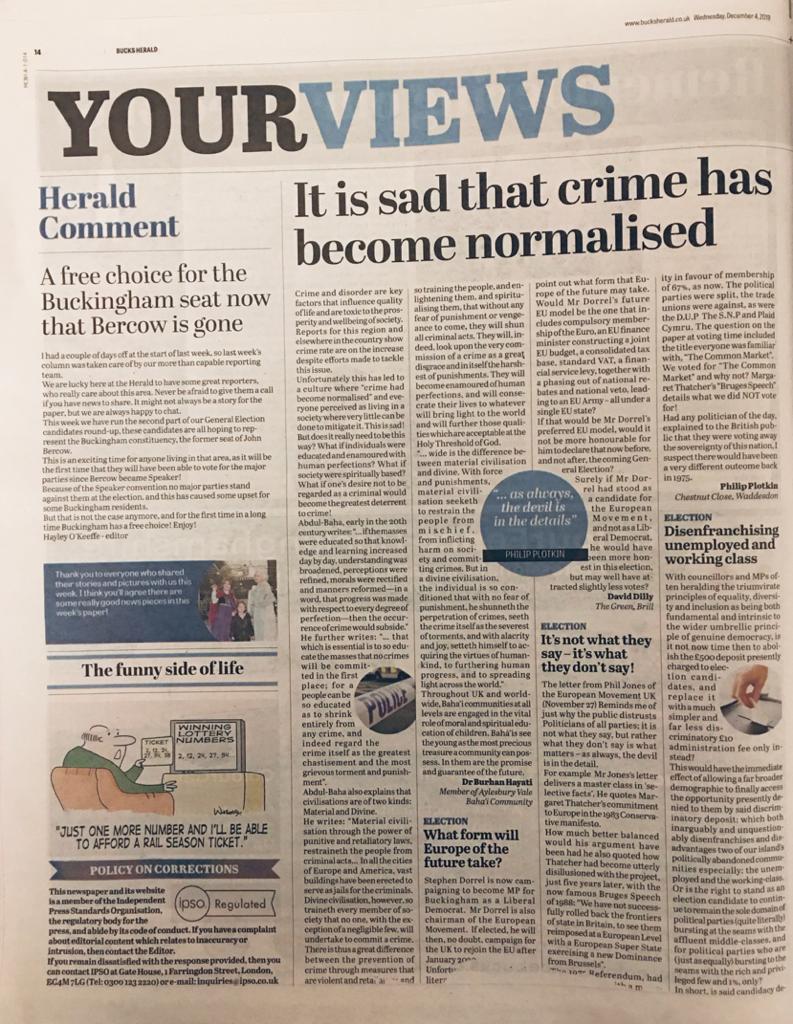Crime and disorder are key factors that influence quality of life and are toxic to the prosperity and wellbeing of society. Reports for this region and elsewhere in the country show crime rate are on the increase despite efforts made to tackle this issue. Unfortunately this has led to a culture where “crime had become normalised” and everyone perceived as living in a society where very little can be done to mitigate it. This is sad ! But does it really need to be this way? What if individuals were educated and enamoured with human perfections? What if society were spiritually based? What if one’s desire not to be regarded as a criminal would become the greatest deterrent to crime! Abdul-Baha, early in the 20th century writes:

“… if the masses were educated so that knowledge and learning increased day by day, understanding was broadened, perceptions were refined, morals were rectified and manners reformed—in a word, that progress was made with respect to every degree of perfection—then the occurrence of crime would subside.” He further writes:
“… that which is essential is to so educate the masses that no crimes will be committed in the first place; for a people can be so educated as to shrink entirely from any crime, and indeed regard the crime itself as the greatest chastisement and the most grievous torment and punishment”.
Abdul-Baha also explains that civilisations are of two kinds: Material and Divine. He writes:
“Material civilisation through the power of punitive and retaliatory laws, restraineth the people from criminal acts… In all the cities of Europe and America, vast buildings have been erected to serve as jails for the criminals. Divine civilisation, however, so traineth every member of society that no one, with the exception of a negligible few, will undertake to commit a crime. There is thus a great difference between the prevention of crime through measures that are violent and retaliatory, and so training the people, and enlightening them, and spiritualising them, that without any fear of punishment or vengeance to come, they will shun all criminal acts. They will, indeed, look upon the very commission of a crime as a great disgrace and in itself the harshest of punishments. They will become enamoured of human perfections, and will consecrate their lives to whatever will bring light to the world and will further those qualities which are acceptable at the Holy Threshold of God.”
“… wide is the difference between material civilisation and divine. With force and punishments, material civilisation seeketh to restrain the people from mischief, from inflicting harm on society and committing crimes. But in a divine civilisation, the individual is so conditioned that with no fear of punishment, he shunneth the perpetration of crimes, seeth the crime itself as the severest of torments, and with alacrity and joy, setteth himself to acquiring the virtues of humankind, to furthering human progress, and to spreading light across the world.”
Throughout UK and worldwide, Baha’i communities at all levels are engaged in the vital role of moral and spiritual education of children. Bahá’ís see the young as the most precious treasure a community can possess. In them are the promise and guarantee of the future.
Dr Burhan Hayati